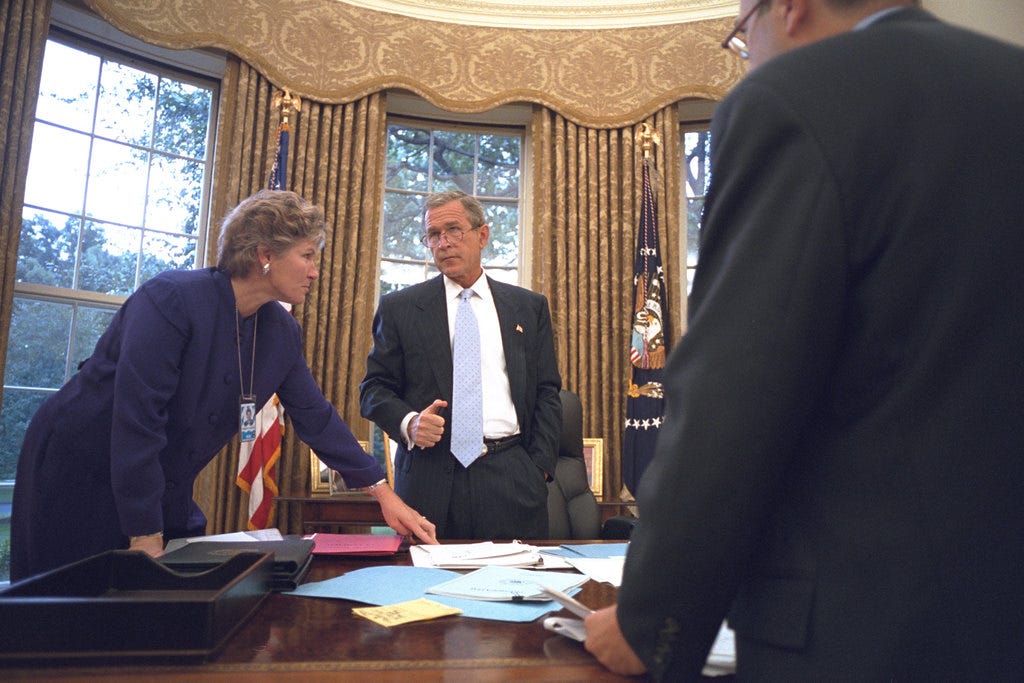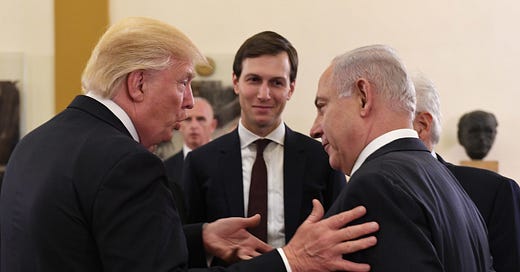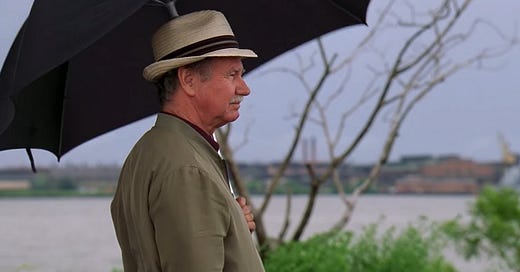
Good Crises Gone to Waste
Recent Republican presidents have squandered golden opportunities to affect positive change. The nation is still suffering from their failures.
Roosevelt was frustrated. The situation in Europe was getting worse by the day, the map of the continent changing before his eyes. In less than a year, Germany had taken Czechoslovakia, Poland, Belgium, the Netherlands, France, Denmark, and Norway. The British forces barely escaped the Nazis at Dunkirk, and the country was being bombarded by the Luftwaffe. Only the existence of the English Channel saved Britain from being totally overrun.
And thanks to a recalcitrant Congress, whose permission he needed to enter the war, FDR’s hands were tied. Short of “lending” weapons and ammo to his British allies, the president could only watch helplessly as the Third Reich gobbled up the continent. The British somehow survived the Battle of Britain— “Never in the field of human conflict,” Winston Churchill later remarked, “was so much owed by so many to so few”—but was reeling; Germany turned to the eastern front, invading Yugoslavia and then Russia. Hitler was going to be Napoleon 2.0, a dictator holding all of Europe—and this was going to happen on FDR’s watch.
Meanwhile, the Empire of Japan, Germany’s ally in the Pacific, was preparing for a blitzkrieg of its own. Tojo, the commander of Japan’s military and architect of its war plans, correctly determined that the European powers were in no position to defend their far-flung colonial outposts. The French could not stop the Nazis from taking Paris; could they really be expected to hold French Indochina? Likewise the British in Burma, Malaya and Singapore, and the Netherlands in the Dutch East Indies, today’s Indonesia. The only imperial power that could realistically stop Japan, Tojo calculated, was the United States, which then controlled the Philippines.
Tojo observed the Americans sitting on the sidelines as Europe burned. He saw the pro-Nazi sentiment among its people, the stubborn isolationist streak that was so similar to Japan’s own preference to look inward and ignore the outside world. In Tojo’s analysis, the United States was soft. One sneak attack, he believed, as surprising as it was devastating, and the Americans would turn tail and leave the Pacific theater. All he had to do was take out the largest U.S. naval base, the one in Hawaii, and follow that up with an invasion of the Philippines. Nazi Germany would control Europe, and Imperial Japan would rule Asia. Autocracy would prevail.
But Tojo miscalculated. Instead of the Americans waving the white flag, the Japanese surprise attack galvanized U.S. appetite for war. As the sun rose on December 7, 1941—a date that now lives in infamy— FDR was powerless to help his allies. The very next day, the U.S. declared war on Japan. The sleeping dog was now awake, and it was snarling.
Pearl Harbor changed the course of history. The event was significant enough to alter the national mood—a jolt to the system of every American—and FDR knew how to use that to his, and the country’s, advantage.
In democracies, change is slow and incremental. This is by design. Tyrants can radically alter whatever they please in a matter of hours; a government of the people, by the people, and for the people necessarily moves at a deliberate pace. People tend not to agree, and even when they agree, their political leaders, having to balance the will of the voters with the money of the donors, might choose to slow-walk the process. It can be frustrating, moving through the political molasses, but that’s how it works.
The exception to the rule is immediately after a moment of major crisis. Pearl Harbor is the best example, but hardly the only time in American history that a president exploited a crisis to accomplish something on his agenda—for good or for ill. Churchill put it best, as Churchill will: “Never let a good crisis go to waste.”
Lincoln used the Civil War to issue the Emancipation Proclamation. Wilson used the Zimmerman memo and the sinking of the Lusitania by a German u-boat to get the United States into the Great War. FDR used the desperation of the Great Depression to establish the New Deal. LBJ used the assassination of JFK to ram the Civil Rights Act through Congress.
Conversely, bungling a major crisis can have a profoundly adverse impact on the country. Herbert Hoover’s presidency is viewed as a catastrophic failure because he botched the federal response to the stock market crash of October 29, 1929; “Black Tuesday” did not directly cause the Great Depression, but Hoover’s ineptitude in the face of that crisis certainly made things worse. Gerald Ford did the country no favors by pardoning his disgraced predecessor, Richard Nixon. Jimmy Carter lost the 1980 election in part because of his inadequate response to the Iran hostage crisis.
After a relatively quiet fin de siècle, the United States has already endured three major national crises in the 21st century: 9/11, the pandemic, and January 6th. All three were enormously significant historical events. And in each case, the crisis, to paraphrase Churchill, went to waste. The two presidents presiding over the federal response—Republicans George W. Bush and Donald John Trump—failed to make use of what fate handed them. To the contrary, their actions made things demonstrably worse. When historians years from now study the decline of the United States—assuming we don’t turn this thing around—they will point to the squandering of those crisis opportunities as the reason.
September 11, 2001 united the country like no other event in my lifetime. In the wake of the terrorist attacks, Americans were collectively eager to help and would have made whatever sacrifice the president requested. He didn’t phrase it quite this way, but what George W. Bush asked us to do with all that patriotic energy and will was…go shopping. Then he responded. First he retaliated against the Taliban, toppling the government that gave safe harbor to Osama bin Laden. That was well and good, but a war whose objective was met in a few months dragged on for years. Next, he attacked Iraq, even though Saddam Hussein had nothing whatsoever to do with 9/11—despite the Bush administration’s ham-handed attempts to convince us otherwise. And if that wasn’t enough, at the moment when he was waging not one but two separate wars on the other side of the world, Bush cut taxes.
The combined price tag of Afghanistan ($2.3 trillion), Iraq ($1.7 trillion), and the tax cut ($1.7 trillion) was a whopping $5,700,000,000,000. (And that’s a conservative estimate.) To put that in perspective: $5.7 trillion is enough to pay off every student loan ($1.75 trillion) and every consumer credit card balance ($930 billion) in the country, with enough left over to write a $9,000 check to every single U.S. citizen. It is a staggering, mind-boggling investment of resources.
And for what? What did we get for the money? The Taliban is back in charge of Afghanistan. Iraq remains such a mess that the power vacuum created by Saddam’s removal helped spur ISIS. And the tax cuts deprived the treasury of vital revenue when we needed it most—and continue to do so. On the other hand, Bush/Cheney donors, the grotesquely wealthy, were made even more grotesquely wealthy, so there’s that.
I thought then, and I still think, that a military strike against the Taliban was indicated. Sticking around to build a new government in Afghanistan was always a fool’s errand. The decision to invade Iraq was made under false pretenses that were obvious even in the moment. And you don’t—you cannot—cut taxes and wage war at the same time. That’s simple math. These were catastrophic errors in judgment by Bush, from which our nation may never fully recover.
What if, instead of “go shopping,” Bush had instead asked Americans to help end our dependency on fossil fuel? Fifteen of the 19 September 11th hijackers, remember, were from oil-rich Saudi Arabia. So was Osama bin Laden. If not for the fact that Ghawar Field is located within its borders, Saudi Arabia would be regarded by our State Department as just another corrupt autocracy, unworthy of our attention. The Kingdom has always had a wretched human rights record. Slavery was not formally outlawed there until 1962. What if Bush used 9/11 as the impetus to pledge $1 trillion to the development of electric vehicles, solar panels, wind farms, and other alternative energy sources? This would have been perfectly logical, given Saudi Arabia’s involvement in the attacks. It would have weaned us off our dependence on other countries for our energy needs, established paradigms for other countries to follow, and combated global warming. That was a missed opportunity that, with the inevitability of climate change, may ultimately prove fatal to life as we know it on earth.
The next great crisis was the pandemic. The Trump Administration could not have bungled the coronavirus response more completely if it were intentional sabotage. I won’t rehash the details here, as I’ve written about this extensively, but Trump, Mike Pence, and Jared Kushner prioritized politics above public health, and money above politics. The result: 1.1 million Americans dead of covid-19.
Not only that, but Trump’s politicization of the pandemic response fostered an irrational suspicion of the federal government—and science!—in a third of the population. During a public health crisis, the government must be trustworthy. No matter how many MAGA radio hosts died of covid, Trump supporters continued to live (and die) in denial about the virus, “doing their own research.” What should have united us pulled us apart.
The ill will towards the government, towards the “Deep State,” towards the “woke” Democrats, and towards democracy itself reached a boiling point on January 6, 2021, when MAGA hordes besieged the Capitol and attempted a coup. The insurrection is unequivocally one of the most important moments in American history, but the sitting president could not make good use of the crisis; Trump was too busy trying to subvert the will of the people and illegally remain in power.
By the time Joe Biden took the reins, the window of real opportunity had closed on both of those Trump crises. The new president was left with a gigantic mess to clean up, and tens of millions of radicalized Americans conditioned to hate his guts. Biden rolled out the vaccines with speed and efficiency. His Department of Justice is taking its time with the insurrection; two-plus years later, the actual coup plotters have yet to be indicted. As for the $5.7 trillion, that money is already gone—although Kevin McCarthy and his MAGA Republican whoremasters are threatening to plunge the United States into default if Democrats do not make cuts to Social Security and Medicare.
The federal responses to 9/11, the pandemic, and J6 were the sort of Visigoths-sacking-Rome-level fuck-ups that, historically, tend to herald the fall of great empires. Somehow we have managed to survive three such blunders. Our response to the next crisis, whatever it may be, must move us forward, not backward. The fate of the nation—and, perhaps, life on earth—depends on it.
Photo credit: Eric Draper, The U.S. National Archives. President George W. Bush meets with Karen Hughes and Mike Gerson in the Oval Office of the White House, September 14, 2001.
















Great article! That said, I will go to my grave saying the biggest wasted crisis was the Global Economic meltdown of 2008...and the blame for that goes to Obama. (And note, he was the next best president to Biden IMO.)
How did he waste it? The administration's response lacked a systems thinking perspective.
Rather than using political capital on healthcare (don't get me wrong, I work in health and that's a huge issue!) he should have gone ALL IN on a green economy. Not green projects—a green economy!
This would have first of all helped mitigate the current climate disruption. It would have reskilled workers in the Rust Belt that would have continued voting "in their interests" and not easily be radicalized. It would have prevented the influence of many now who are trying to dismantle the global economy. It would have headed off Mogilevich and the oligarchs from going after more oil...and the Rosneft arctic shelf...by making oil / fossil fuels less important.
It could have been pitched like the Marshall Plan. And once the economy was moving, and once those that were easily radicalized by having no economic prospects are instead supporting policies, it would have made the healthcare initiative more palatable and less divisive.
I'm not saying this would have been EASY! But it was the right response to the crisis. And could have made the current polycrisis we're navigating less likely to happen...or at least less severe.
Excellent essay. Definitely among your best work I've seen. What I would never have believed is the percentage of brain-dead among our electorate who continue to believe the first two crises were handled well, and that J6 wasn't a crisis at all. Sad.